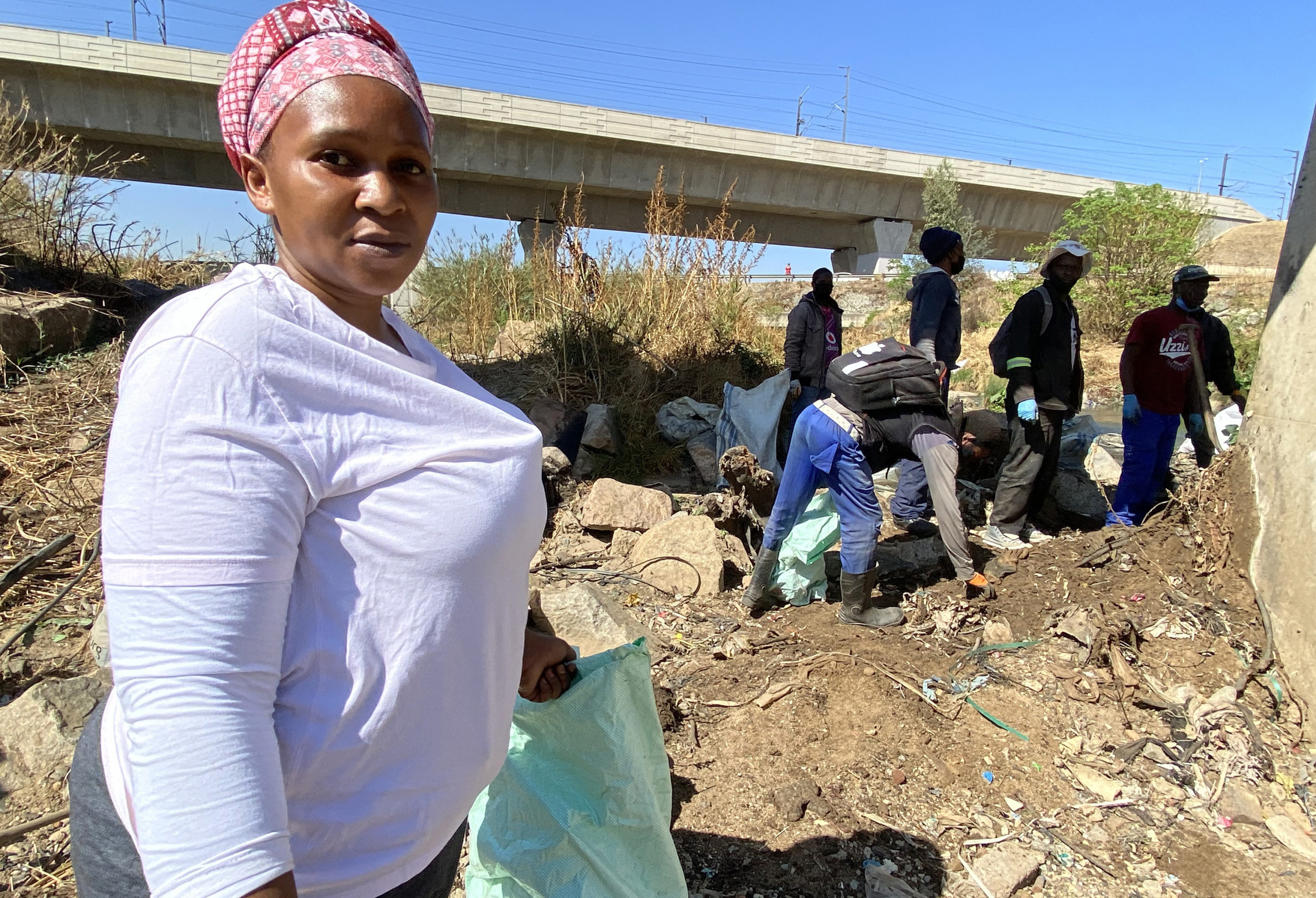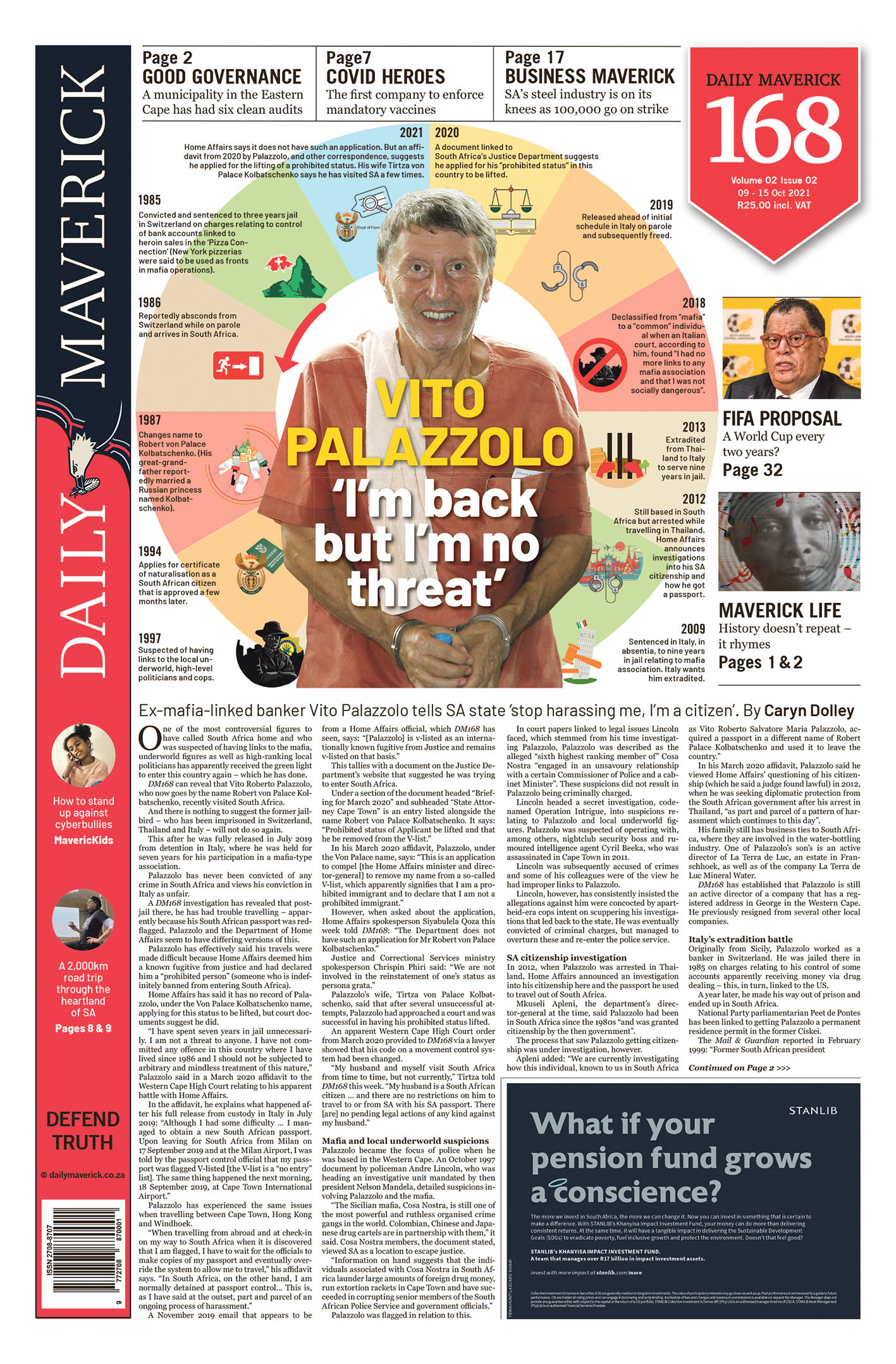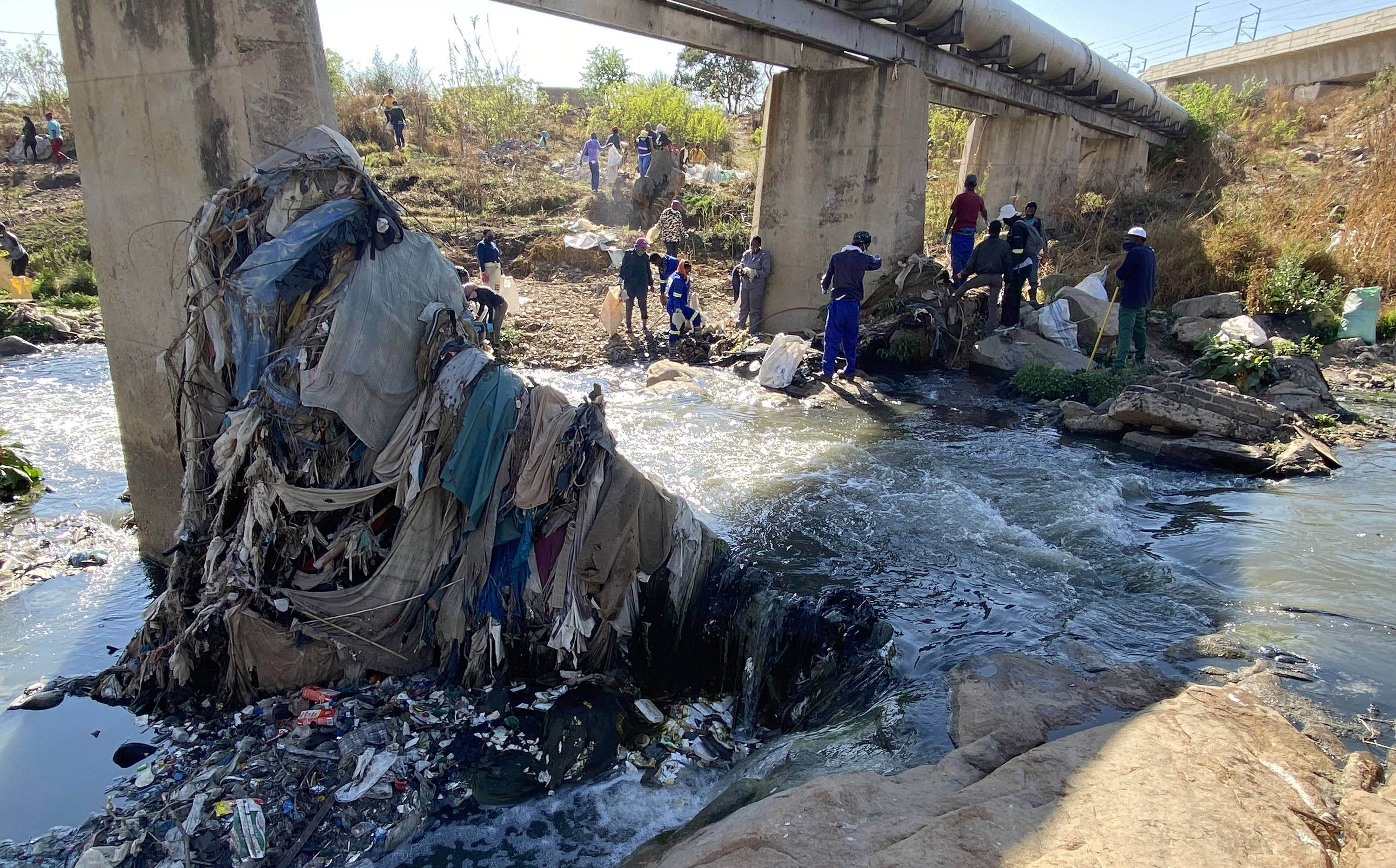There are 52 million E. coli counts per 100ml water within the Kaalspruit, one of the sources of the significant Hennops River in Gauteng. The acceptable limit is 400 to 600 counts — without the millions.
Originating in Tembisa, the Kaalspruit is at its birth abused by builder’s rubble, human effluent from at least 1,400 illegal shacks on its banks as well as by chemicals from factories. As it gathers pace, it winds its foamy way through lifestyle estates and more illegal shacks on the river’s banks, en route to the Hartbeespoort Dam, ultimately flowing into the Limpopo River.
Some way southeast, the water at the Rietspruit in Sebokeng has E. coli counts of 9,188,000 per 100ml, according to the quarterly water-quality results of the largest water utility in Africa, Rand Water.
Nine million is better than 52 million, but both are light years beyond the acceptable limit.
Although E. coli and other pathogens are naturally present in water to some degree (less than 250 counts per 100ml), these concentrations are significantly increased when faecal pollution has occurred. People and animals may adapt to low levels of E. coli, which increases the likelihood of infectious diseases and gastrointestinal issues.
The risk of health effects is increased when the polluted water source is used as drinking water, to irrigate crops and for washing and recreational activities, which all serves to increase the load on the individual. Other health considerations, such as malnutrition, age or comorbidities, can cause a lowered resistance to infectious waterborne diseases.
South Africa is a dry country, classified as semi-arid, receiving just under half the average annual rainfall (464mm) of the rest of the world. With the country predicted to become drier as southern Africa is shoved into a furnace of a future by climate change, such astronomical E. coli numbers — widespread if you consider the increasing number of failed and failing rural and urban municipalities — should alone remove the governing party from power at the impending polls.
 Jukskei River clean-up: Busisiwe Tyala says there are no bins, no skips, so peeps use the river as a bin. (Photo: Angus Begg)
Jukskei River clean-up: Busisiwe Tyala says there are no bins, no skips, so peeps use the river as a bin. (Photo: Angus Begg)
The figures were recently released at catchment management forums within the Crocodile West/Limpopo and Rietspruit catchment management areas by the City of Ekurhuleni and Rand Water respectively. It’s these sorts of results that influenced the Department of Water and Sanitation’s (DWS’s) Master Plan Call to Action in October 2018, which aimed to address this situation.
The DWS master plan provides the basis for comprehensive engagement with water sector partners to identify critical challenges confronting the sector, and to define actions and interventions with specified time frames, roles and responsibilities.
The report contained some damning findings, among them the following:
- At least 56% of waste-water treatment works and 44% of water treatment works are in a poor or critical condition; 11% are dysfunctional;
- More than 50% of South Africa’s wetlands have been lost and, of those that remain, 33% are in poor ecological condition;
- Between 1999 and 2011 the extent of main rivers in South Africa classified as having a poor ecological condition increased by 500%, with some rivers pushed beyond the point of recovery; and
- The extent of tributaries with a poor ecological condition increased by 229% in this same period.
By all reports, conditions surrounding South Africa’s water infrastructure have dramatically worsened. Recently, Daily Maverick reported that, with “a third of its sewage plants only partially operational, the Chris Hani District Municipality is responsible for years of waste running into the Eastern Cape’s rivers”.
No toilets, no bins
Participation in a clean-up of a 30m section of the Jukskei River, where it passes Alexandra township’s east bank, recently revealed to this writer a dead dog, live electric cables, years of rubble and plastic as well as mountains of clothing, blankets and shoes that were either impeding or blocking the river’s progress as it flows northwest from Johannesburg towards the Hartbeespoort Dam.
Two weeks ago, east bank resident Busisiwe Tyala says an eight-year-old child was killed after playing with an exposed, illegal electricity connection. Wendy Malpage, who runs Bubele Afrika, an NGO dedicated to cleaning up the Jukskei, confirmed she’d heard of the incident.
Tyala says “there are no bins, no skips, so people use the river as a bin”.
In just five minutes, that short stretch of urban river exposed the decrepit state into which much of Johannesburg and its surrounding water infrastructure has sunk: a deadly illegal electricity connection; the complete absence of council services; citizens doing the job of the city council; and the private sector, already taxed to the hilt, paying for “volunteers” to do the job.
That is beyond the faeces, litter and the alleged death of a child.
Johannesburg was, twenty years ago, famed for its water quality. In a Sunday Times article from that period, the city’s tap water was ranked alongside Perrier and various other mineral waters. Its descent into the sh*t and slime of the sewers cannot be blamed on apartheid, but on a stunning lack of integration and cooperation between a multitude of “authorities” that resembles a Monty Python skit.
The City of Johannesburg had not answered questions at the time of going to print, and the Gauteng Province — which is responsible for the Hennops and Jukskei — referred questions to the City. And here’s part of the problem: various agencies within the City of Johannesburg manage its water — the Johannesburg Roads Agency manages the stormwater system, Environmental Management is responsible for the catchment, and Johannesburg Water manages water and sewage. So what happens in the case of more than one accountable agency?
Gauteng Province says the DWS is the custodian of water resources in the country. DWS spokesperson Sputnik Ratau says that, although it offers support to local government, its primary role remains being that of a regulator. “Sec[tion] 156 read with Schedule 4 part B of the Constitution indicates that Local government is responsible for (i) Pollution, (ii) stormwater management, (iii) the potable water supply systems and wastewater treatment systems; and (iv) Bylaws.”
Mariette Liefferink, a water rights and conservation activist, has long been battling the “lack of accountability” and issues raised above. As the head of the Federation of Sustainable Environment NGO, she has played the role of the proverbial “pain in the arse” of the Gauteng government and municipal authorities for more than 20 years.
Starting her activist life with a victorious battle against Royal Dutch Shell, “one woman against a major multinational”, Liefferink soon became involved in the effects of mining on the environment, water and communities. Today, she is constantly on the collective back of public servants whose job it is to ensure we have safe water.
Her experience of dealing with government and official reports, at national, provincial and municipal level, means she calls it as she has come to see it, referring to “organs of state too incompetent to respond timeously to scientific warnings and community concerns as a result of capacity absences; a lack of skill and a conscious amnesia because of poor record management”.
The request to the DWS to respond to the “damning findings” in its own master plan was met with a vague response, referring to plans, strategies, investigations and monitoring: “It may be premature to conclude that none of the priorities/recommendations are being implemented before the target dates set,” said DWS’s Ratau.
Liefferink says the public is tired of hearing about plans, policies and strategies. “What is called for is urgent and bold action,” she says.
The DWS points out that its primary role is that of a regulator, offering “support” to local government. But it appears the one needing support is Liefferink, who says her efforts to obtain access to public records were blocked by local authorities, flouting constitutional safeguards in the process.
Active citizenry
DM168 has seen more than two months of correspondence between Liefferink, who, from her letters, has had to grovel and shine the boots of disinterested local, provincial and national officials just to get access to public records to which the public is entitled.
She says trying to hold government accountable for a resource that falls clean from the sky into rivers and should be managed by its municipal and regional authorities has cost her “a fortune”.
 The Jukskei flowing through Alexandra township, according to Alexandra riverbank residents, used as a bin, because they 'don’t have any’. (Photo: Angus Begg)
The Jukskei flowing through Alexandra township, according to Alexandra riverbank residents, used as a bin, because they 'don’t have any’. (Photo: Angus Begg)
“Frustration aside, the time, telephone calls, internet usage, petrol and travel costs, conferences, environmental tours and workshops, financial assistance to communities, research and lawyers’ fees, printing costs over the past 15 or more years amount to millions of rands, maybe R10-million.”
This is R10-million paid by a private citizen just to ensure her fellow citizens of affected areas know how bad the water situation in Gauteng is, like the 52 million E. coli counts per 100ml flowing into the Hennops.
As arguably demonstrated by the directives issued to the Chris Hani Municipality, and the legal actions taken against municipalities running the towns of Lichtenburg and Lydenburg (as well as many others not mentioned), the political will and skills required to manage our water daily, which is especially essential for life in a semi-arid part of the world, no longer seem to be there.
Which leaves the fight to preserve this woefully under-rated resource now in the hands of “active citizenry”, people like Liefferink and on-the-ground water warriors such as Samuel Mashimbi of Tembisa, Tarryn Johnston’s Hennops Renewal, Willem Snyman’s Fresh and Wendy Malpage, of Bubele Afrika, who recently started a clean-up campaign of the Jukskei.
Liefferink recalls why it was that she became a water activist, adding other concerns of critical importance to the gruesome figures above, like the failure of the DWS to identify and prosecute big polluters across the country.
“They just offer platitudes,” she says. “Again and again, from one year to the next.” DM168
This story first appeared in our weekly Daily Maverick 168 newspaper which is available for R25 at Pick n Pay, Exclusive Books and airport bookstores. For your nearest stockist, please click here.





 The Jukskei flowing through Alexandra township, according to Alexandra riverbank residents, used by them as a bin, because they 'don’t have any’. (Photo: Angus Begg)
The Jukskei flowing through Alexandra township, according to Alexandra riverbank residents, used by them as a bin, because they 'don’t have any’. (Photo: Angus Begg) 